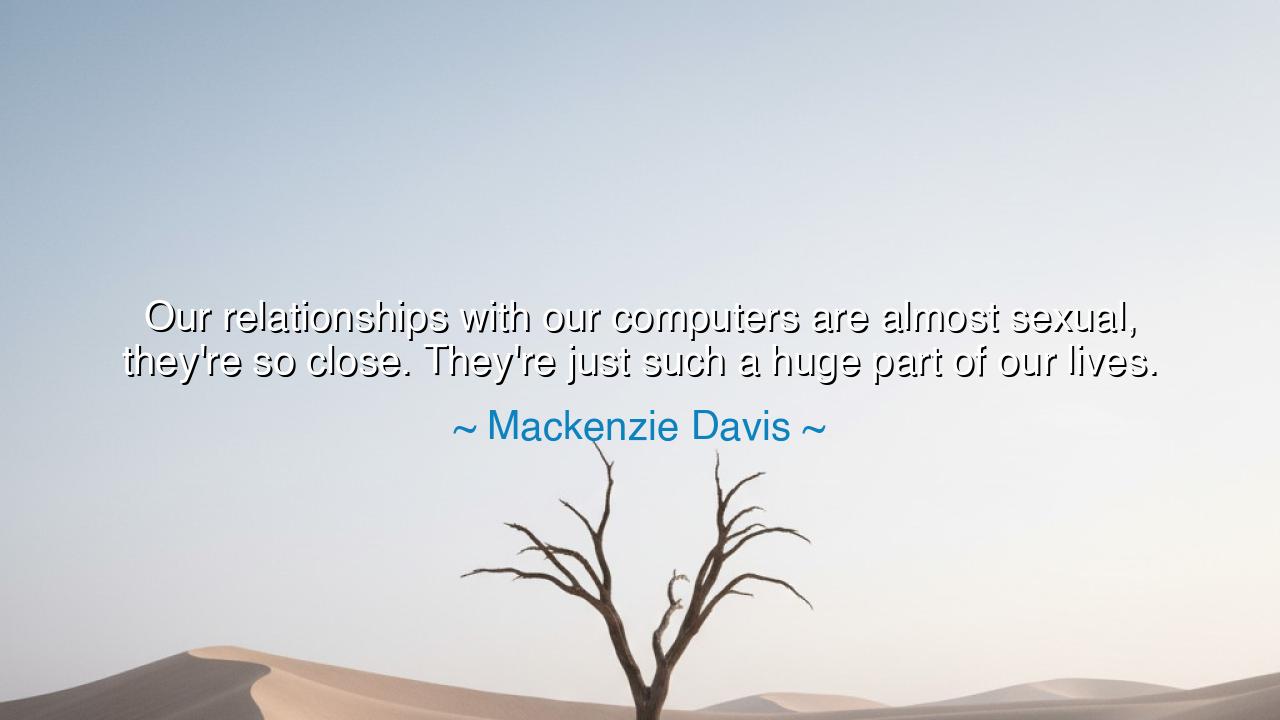
Our relationships with our computers are almost sexual, they're
Our relationships with our computers are almost sexual, they're so close. They're just such a huge part of our lives.






In the unfolding narrative of human existence, there are moments when new inventions arise that transform the very fabric of our lives—shifting our relationships with the world and with each other. The computer is one such creation, and as Mackenzie Davis insightfully observes, “Our relationships with our computers are almost sexual, they’re so close. They’re just such a huge part of our lives.” In this provocative statement, Davis captures a profound and deeply emotional truth: our relationship with technology, particularly the computer, has become so intimate, so entwined with our daily existence, that it mirrors the closeness and dependency once reserved for human connection.
To understand the depth of this observation, we must look back to the origins of technology itself. The ancient Greeks, with their reverence for innovation and intellect, often pondered the role of tools in shaping the human experience. The wheel, the plow, and the sail were all seen not merely as instruments of labor but as extensions of the human will, enabling humanity to transcend its physical limitations. In much the same way, the computer has become an extension of our mind and soul. It is no longer just a tool we use—it is a partner in our lives, guiding us, shaping us, and often defining us.
Consider the ancient story of Hephaestus, the Greek god of blacksmithing and invention, who created incredible tools and weapons that were infused with such power that they seemed almost alive. His creations were not merely inanimate objects; they were deeply tied to the fates of the gods themselves. Much like Hephaestus’ inventions, the computer has become imbued with a kind of life—it is no longer just an object of metal and wires, but a central figure in our daily existence, influencing our actions, decisions, and thoughts. It speaks to us, we speak to it, and together we form a symbiotic relationship—a bond that is both intimate and essential to our survival in the modern world.
In the modern age, the computer has become more than just a tool—it is a constant companion. It keeps us connected to the world, facilitates our work, and even shapes our emotions. The rise of social media and online communication has only deepened this connection, creating a space where we express ourselves, share our lives, and build our identities. Just as romantic relationships are defined by moments of closeness, emotional exchange, and mutual dependence, so too has our relationship with computers taken on an almost intimate nature. It is no surprise, then, that Davis uses the word "sexual"—for like love, our relationship with computers is both deeply personal and all-consuming.
Consider the story of Alan Turing, the brilliant mind whose work laid the foundation for modern computing. Turing’s machine was not simply a tool—it was a revolutionary step in creating something that could think, learn, and solve problems. It was a vision of what could come, a vision of a world in which the human mind would be amplified by the tools it created. The relationship Turing had with his own machines was one of creation and dependency, much like our own relationship with computers today. They are not just devices to us; they are companions, guides, and in many ways, an extension of our own minds.
Yet, as we grow ever closer to our computers, we must also acknowledge the danger inherent in this relationship. Just as the ancient heroes were sometimes undone by their reliance on powerful weapons, so too can our reliance on computers leave us vulnerable. In ancient times, the gods bestowed their gifts of power, but those who misused them often faced downfall. Similarly, our intimate relationship with technology can lead to a loss of balance, a detachment from the very humanity it was meant to serve. If we allow computers to dominate our lives, if we place too much trust in their consistency and logical order, we may lose touch with the more irrational, spontaneous, and deeply human aspects of our existence.
The lesson, then, is one of awareness and balance. We must acknowledge the incredible power that computers have in our lives, but we must also be wary of becoming too dependent on them. Like the ancients who understood the need for balance in all things—whether in their relationships, their work, or their use of tools—we must find a way to harmonize our connection with technology while preserving the essence of what makes us human. Let us not be consumed by the tools we create but use them to amplify our humanity, to reach new heights of creativity and understanding, while never forgetting the importance of emotional connection, spontaneity, and the mysteries of life that computers can never fully capture.






AAdministratorAdministrator
Welcome, honored guests. Please leave a comment, we will respond soon